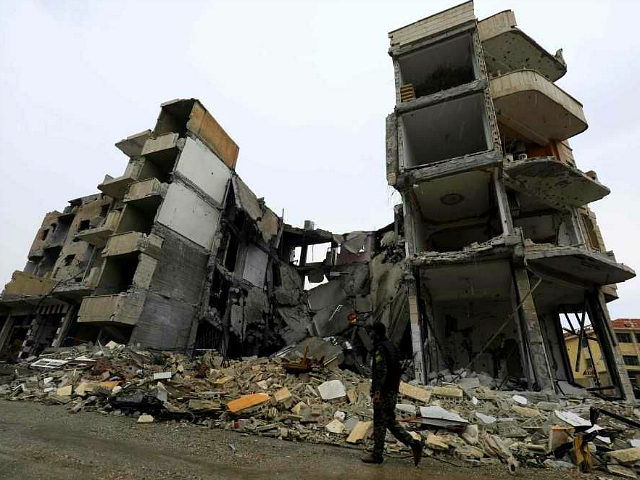Amnesty International published a report on Monday accusing the U.S.-led coalition against ISIS of potentially committing war crimes during its assault on the Islamic State capital of Raqqa, Syria.
The report, entitled “War of Annihilation: Devastating Toll on Civilians Raqqa-Syria,” takes issue with the U.S. government’s portrayal of the four-month operation in the summer of 2017 as surgically precise with minimal civilian casualties. The title references a quote from Secretary of Defense Jim Mattis promising a faster, tougher campaign to topple the Islamic State.
Based on visits to 42 locations in Raqqa, interviews with 112 witnesses and survivors, and a review of satellite imagery and public documents, Amnesty declared it has uncovered “prima facie evidence that several Coalition attacks which killed and injured civilians violated international humanitarian law.”
The report concedes that ISIS “exacerbated the challenges inherent to urban combat by operating amongst civilians and using them as human shields” – and elsewhere further concedes that ISIS deliberately targeted civilians with sniper fire and land mines – but charges the U.S. coalition with taking inadequate precautions to protect civilian life.
Much of the Amnesty International report undermines its own case by mentioning how viciously ISIS persecuted civilians trapped in its clutches, sometimes murdering them simply to convince other civilians it was better to pay ISIS-linked human smugglers to get out of Raqqa than risking their lives by running away on their own.
Most of the eyewitness accounts families who claim to have suffered losses to coalition bombing provided also include a tally of family members deliberately killed or pushed into harm’s way by ISIS savages.
Amnesty condemns the coalition for attacking structures where ISIS fighters were mixed with refugees, and where ISIS fighters may not have been present at all, although the report admits this is difficult to determine even with hindsight. The coalition is also criticized for working out ceasefire agreements with Islamic State fighters that allowed them to leave besieged quarters of Raqqa even while bombing campaigns against those same areas were killing civilians.
One passage of the report castigates the coalition for refusing to “acknowledge the scale of harm caused to civilians by the military campaign,” zeroing in on a comment by a U.S. military adviser who said the U.S. Marines fired more artillery shells into Raqqa than any unit since the Vietnam War.
“Given that standard artillery shells fired from an M777 howitzer have an average margin of error of over 100m, launching so many of these shells into a city where civilians were trapped in every neighborhood posed an unacceptable risk to civilians,” Amnesty International responded. “Yet despite incontrovertible evidence of civilian casualties and wholesale destruction in Raqqa, and the high level of civilian casualties, the Coalition narrative remains unchanged.”
“What leveled the city and killed and injured so many civilians was the US-led coalition’s repeated use of explosive weapons in populated areas where they knew civilians were trapped. Even precision weapons are only as precise as their choice of targets,” Amnesty International Senior Crisis Response Adviser Donatella Rovera told CNN on Tuesday.
The coalition responded to Amnesty International’s allegations by insisting it “applies rigorous standards to our targeting process and takes extraordinary efforts to protect non-combatants.”
The coalition also rejected AI’s allegations that it has not been sufficiently transparent about the planning and execution of strikes in Raqqa.
“We do everything we can to minimize the risk to civilian life through our rigorous targeting processes and the professionalism of the (Royal Air Force) crews but, given the ruthless and inhuman behavior of (ISIS), and the congested, complex urban environment in which we operate, we must accept that the risk of inadvertent civilian casualties is ever present,” a spokesman for the British Ministry of Defense said in a statement quoted by CNN.
Amnesty International’s recommendations include forbidding the use of wide-area munitions in areas where civilians could be present, assuming civilians are present in every urban warfare operation against enemies prone to using human shields, giving advance warning of airstrikes, and calling off any attack that risks collateral damage to civilians.
Taken together, these recommendations would make effective operations against an enemy like the Islamic State impossible. Their fighters certainly would not stand around and wait for airstrikes telegraphed in advance to give civilians plenty of time to evacuate. It will hopefully be some time before an operation like Raqqa is necessary against the Islamic State, but other terrorist foes prone to using human shields – such as Iran’s terrorist proxies and Palestinian militant organizations – would love to fight under rules of engagement that effectively shield them from air and artillery assault.
There is also the grim question of whether tight rules of engagement that cause operations like Raqqa to drag out for years are just a different kind of crime against humanity, as they leave civilian populations in the clutches of monstrous evil like the Islamic State. There are no easy answers to questions like that, which is why the twisted devotees of asymmetrical warfare are so eager to implant their fighters in dense civilian populations and hide their weapons in schools and hospitals. Sending a firm message that such tactics will not be effective could help to avoid a significant amount of civilian suffering.
Voice of America News noted on Monday that, while Raqqa was indisputably devastated by the ISIS occupation and its fiery conclusion, about 132,000 civilians have returned to the city since the conclusion of the coalition operation in October 2017. The recommendations at the end of Amnesty International’s report included more funding and advance preparations for getting civilians out of occupied cities and helping them return after the occupiers have been displaced.

COMMENTS
Please let us know if you're having issues with commenting.